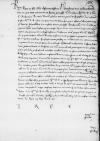 AAWO, AB, D. 9, f. 108r
AAWO, AB, D. 9, f. 108r
Reverendissime Pater et Domine, domine observandissime.
Humillima mei recommendatione cum ea, qua decet, reverentia et honore praemissis.
⌊⌋ Reverendissimae Paternitatis Vestrae ad dominum ⌊Philippu paper damaged⌈[Philippu]Philippu paper damaged⌉m Archintum⌋ ⌊Ro(mae) Urbis⌋ vicarium generalem datae non parum mihi profuere, imo in favorem eiusdem Reverendissimae Paternitatis Vestrae rebus ac negotiis meis, ut felicem sorterentur effectum ultro patrocinatus et adeo, ut favorabilibus suis consiliis ductus, pro festo Ascensionis Domini cum nonnullis peregrinis ⌊Iherusalem⌋ etiam visitaturis me recepi, licet in itinere citra ⌊Loretum⌋ incidi in vertiginem capitis adeo graviter, ut mihi ipsi diffiderem. Nihilominus tamen propter ⌊dominum reverendissimum Upsalensem⌋, tum in ⌊Patriarchatu dominorum Venetorum⌋ existentem, modo, quo poteram, properavi, suam reverendissimam paternitatem in agendis consulturus. Quae, singulis exacte pensatis rei circumstantiis, ne tam arduam rem attemptarem in hac aetate praesertim, omnino dissuasit, quemadmodum et alias doctor ⌊Casparus⌋, singularis patronus meus et benefactor, ante meum exitum ab ⌊Urbe⌋, praeconceptum meum propositum salubribus persuasionibus retrahere conabatur, aetatem ac personae qualitatem (sicut et dominus ⌊archiepiscopus⌋ ⌊Venetiis⌋) abunde considerans, ut uno et eodem spiritu ambo et uterque, iste ⌊Romae⌋, ille ⌊Venetiis⌋ loquebantur dicentes, ne temptarem Deum etc.
Igitur, Reverendissime Pater et Domine, meam imbecillitatem ac tantorum dominorum meorum sana consilia perpendens, cogor ab ipsa peregrinatione retrahere pedem ⌊Romaeque⌋ Deo militare, eo quod certo voto imprimis peregrinationis non sim astrictus et quia dictus dominus doctor ⌊Hannovius⌋ propter suam innatam virtutem et perspicuam bonitatem me et venerabilem virum dominum ⌊Nicolaum⌋, consocium meum, domus ⌊Divae Birgittae⌋ provisorem superinscribed⌈provisoremprovisorem superinscribed⌉ omni favore et humanitate sincero affectu multiformiter prosecutus est. Obligantur et nos ad omnem benevolentiam et obsequiosam promptitudinem Reverendissimae Vestrae Paternitati ac ipsi egregio doctori ⌊Hannovio⌋ tamquam ex debito semper exhibendam.
Ceterum de statu ⌊Italiae⌋ et his, quae hic aguntur vel recenter actae sunt, idem dominus ⌊doctor⌋, lator praesentium, magis certificatus latius viva voce coram (quam ego scribere) referre poterit.
Valeat cum hoc Reverendissima Paternitas Vestra ad multos annos fausta ac felicissima, Domino Deo Optimo Maximo perpetuo recomissa. Quae et suum humilem Speilbergum (licet inutilem) gratia solitis et favore prosequi non dedignetur.


 AAWO, AB, D. 9, f. 108v
AAWO, AB, D. 9, f. 108v